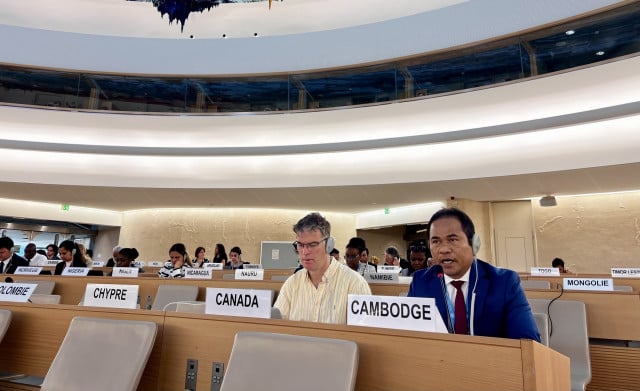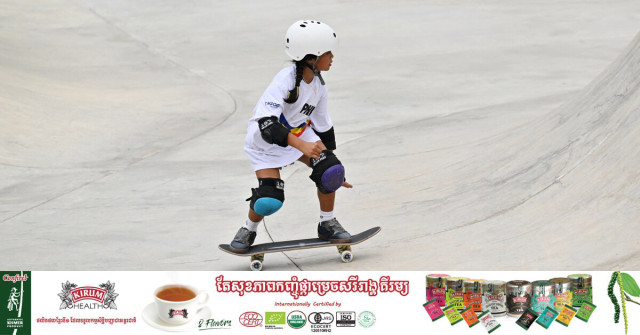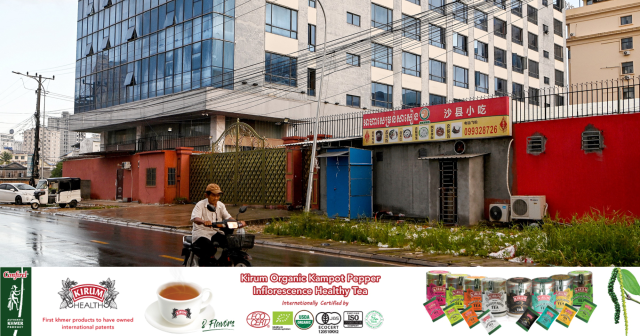Cambodia’s UN Representation Lists Human Rights Achievements

- By Phoung Vantha
- July 17, 2023 5:05 PM
PHNOM PENH – The Cambodian permanent mission to the United Nations in Geneva has set out a list summarizing its actions to defend human rights in the country, while the U.N. Human Rights Council (HRC) 53rd session came to an end on July 14.
The HRC oversees the Office of the United Nations High Commissioner for Human Rights (OHCHR) which appoints the independent Special Rapporteur on the situation of human rights in Cambodia. Several times a year, the Geneva-based body holds weeks-long sessions to assess the situation of human rights in its member states.
In his inaugural speech on June 19, U.N. High Commissioner for Human Rights Volker Türk highlighted that Cambodia has been the organization’s longest field of engagement which supported “many legal and institutional reforms.”
Yet, he raised concerns over the human rights situation in the country, saying he is “alarmed by the shrinking of civic space in the lead-up to national elections in July.”
While the Candlelight Party, Cambodia’s only credible opposition force, has been barred from running for the elections, several of its members or supporters have been arrested.
The plurality of the media has also been reduced, with the shutdown of the Khmer and English news website Voice of Democracy in February 2023.
On July 12, the Telecommunications Regulator of Cambodia also instructed Internet Service Providers (ISPs) to block access to several media outlets’ websites or social network pages. Among them are the Cambodia Daily (a U.S.-based version of the former Cambodia-based newspaper), Radio Free Asia, and the newly-launched website Kamnotra.
After 38 meetings spread over four weeks, the HRC adopted several resolutions on issues specific to each country.
Among the submissions related to Cambodia, one came from Sina Seng, the brother of the human rights defender Theary Seng, who has been in jail for more than a year.
“Theary’s case is part of a pattern of regime abuse and retaliation against democracy and human rights advocates. The regime has weaponized its court system to reduce civic engagement and to silence opposition,” he said.
Theary Seng, a dual American-Cambodian citizen, was convicted alongside 60 others and jailed for six years on charges of conspiring to commit treason. Prime Minister Hun Sen has ruled out pardoning her.
On July 13, another U.N. body, the United Nations Working Group on Arbitrary Detention, called for her immediate release.
Following an 11-day visit to Cambodia in August 2022, the country’s Special Rapporteur on the Situation of Human Rights Vitit Muntarbhorn came to the conclusion that the situation of human rights in the country was a “pervasive paradox.”
While he acknowledged Cambodia “had achieved much internationally-recognized progress and had also ratified most core human rights treaties,” he issued a 10-point human rights agenda to improve the situation in Cambodia, urging to “open up civil and political space and pave the way for democratic reform.”
Muntarbhorn also said Cambodia should “activate counter-measures more strongly” to tackle the issue of human trafficking linked to scam companies, whose victims are experiencing a “living hell.”
Cambodia’s representation lists its achievements
In contrast, Cambodia’s mission to the U.N. in Geneva highlighted its successes. In a press release issued on July 16, it said it aims to guarantee vulnerable groups’ access to justice and legal protection, through volunteer lawyer units of the Prime Minister, the Cambodia Human Rights Committee, and the Bar Association, or NGOs.
“Pro-bono lawyers units of the Prime Minister, deployed in all the localities across the country, have provided legal support to journalists who face litigation, in addition to the vulnerable group,” the mission said.
As a party to the Convention on the Elimination of All Forms of Discrimination against Women, Cambodia was committed to eliminating all discrimination against women and girls while advancing gender equality and women’s empowerment in all sectors.
The government “has taken steps to safeguard the well-being and rights of women and children, with a view to ensuring a more supportive and nurturing environment for all,” stated the press release.
Wide-ranging policies, programs and strategic plans have also been put in place to protect and promote the rights of migrant workers.
“Cambodia has signed [Memorandum of Understandings] with host countries to ensure that the rights of over Cambodian workers abroad are protected and upheld,” Cambodia’s mission to the U.N. added.
While the country’s poverty rate declined from 36.7 percent in 2014 to 16.6 percent in 2022, according to United Nations Development Program (UNDP), Cambodia’s representation in Geneva took the chance to recall the government’s measures to financial support households affected by the economic downturns of the COVID-19 pandemic.
“To date [the government] has rolled out wide-ranging support schemes, to name a few, the cash transfer program to poor and vulnerable households, tax exemption for affected sectors, and cash relief programs for job-suspended workers,” it said.















